The UN's Humanitarian Response to Haiti
Sir John Holmes, UN Under-Secretary–General for Humanitarian Affairs
and Emergency Relief Coordinator
Photos | Transcript
New York, NY—On July 19, 2010, Sir John Holmes, Under-Secretary-General for Humanitarian Affairs and Emergency Relief Coordinator for the United Nations, spoke with a group of WFPG members and guests on "The UN's Humanitarian Response to Haiti." Sir John assumed his current position in 2007 and has been the point person for coordinating the UN response to the January 12th earthquake.
At the event, which was co-sponsored by the Institute of International Education, Sir John discussed the progress that has been made in Haiti over the past six months, as well as the challenges that lie ahead in continuing relief and reconstruction efforts. While many have criticized the humanitarian response in Haiti, citing the persistence of poverty and lack of infrastructure throughout the country, Sir John emphasized that "the disaster didn't come from nowhere; it was all hitting a country which is already very disaster–prone and in a very poor state in all sorts of ways." Many of the issues that Haiti had been struggling with before the earthquake – such as poor governance, poverty, underdevelopment, and corruption – made humanitarian relief efforts much more difficult.
Reflecting on his recent trip to Haiti, Sir John outlined the UN's priorities in terms of humanitarian relief, citing the importance of search and rescue efforts, medical treatment, food, clean water, shelter, and emergency education in the immediate wake of the disaster. "Six months on," he said, "those basics have been provided" and the focus has turned towards reconstruction. He emphasized, however, that relief and reconstruction would need to continue simultaneously, and that financial support would be needed to maintain both efforts.
Responding to concerns about the overwhelming amount of donations that have yet to be spent by humanitarian organizations, Sir John encouraged patience: "it's right not to rush into just throwing money in all directions, because it isn't necessarily going to help." He reiterated that donations to big, reputable organizations will be used for relief and reconstruction in Haiti, and that these contributions will not "disappear into somebody's pockets." Sir John explained that reconstruction is a long–term process, and that it will take at least ten years before the international community has "really done enough to restore things and hopefully build them back better." Reconstruction efforts, he said, should focus on creating sustainable jobs, reforming the country's health system, bolstering infrastructure, and developing long–term solutions for clean water and sanitation.
Sir John also addressed the immense problems associated with rubble removal and shelter construction. The current short–term plan, which is to remove two million cubic meters of rubble out of priority areas in the next three months, will cost $120 million dollars and will remove just 10% of the total rubble in Port–au–Prince. Once the rubble has been cleared, transitional and permanent housing construction can begin. However, land tenure issues are particularly salient in Haiti and both humanitarian agencies and the government have faced major obstacles in trying to free land for shelter construction. Sir John also highlighted the widespread fear by local authorities and landowners that "if you put a lot of transitional shelters somewhere in an open area ... that will not be a temporary arrangement, that will turn into a permanent slum."
In the interim, displaced Haitians are living in camps throughout the region. Not only are these camps often in locations particularly susceptible to floods and other natural disasters, but they have also become dangerous places, particularly for women, due to the high levels of sexual violence. Sir John highlighted certain steps that humanitarian organizations were taking to address this issue, including separating women's and men's toilets, improving lighting, and increasing police presence within the camps.
Looking forward to future humanitarian disasters, Sir John underscored the need for greater investment in coordination efforts and greater sensitivity to "local concerns, local desires, and local capacity." Ultimately, he stressed that the international community must remain committed to helping Haiti recover and move forward, because "the media searchlight moves somewhere else, but the problems don't change. The problems are still there."
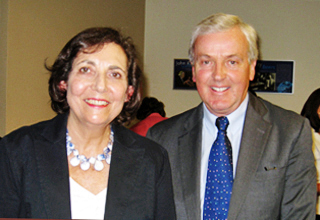 |
 |
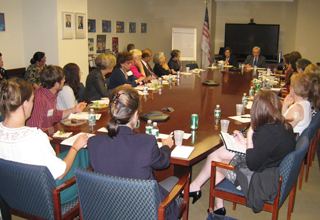 |
WFPG President Patricia Ellis,
Speaker Sir John Holmes
|
|
Sir John addresses WFPG members and guests
|
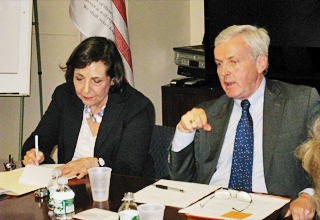 |
 |
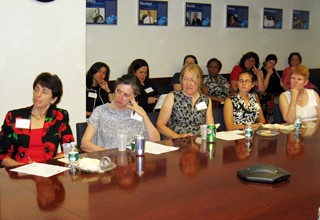 |
| |
|
|
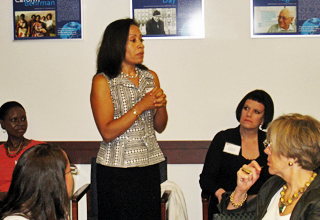 |
 |
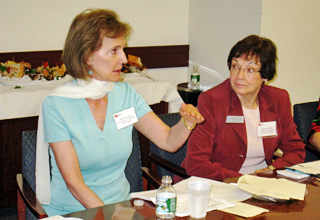 |
A member of the audience asks a question during Q&A
|
|
WFPG Board Member Gillian Sorensen asks a question
|
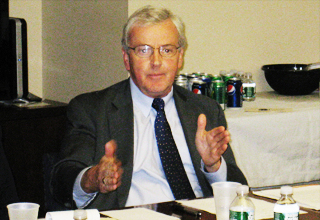 |
 |
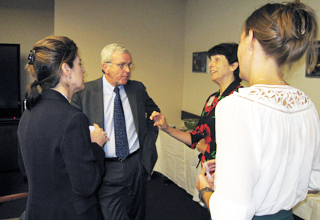 |